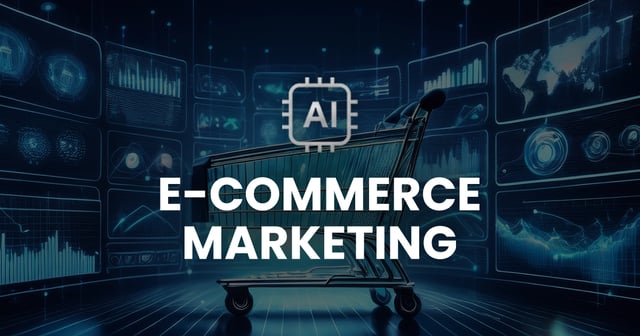Beyond the Buzzwords: Master Strategic AI E-commerce for Lasting Success

Learn how to orchestrate AI tools across the entire buyer journey to drive sales, loyalty, and growth.
In today’s fiercely competitive e-commerce landscape, simply keeping up isn’t enough. To truly thrive, businesses need a strategic edge. Artificial Intelligence (AI) offers that edge, but its true power isn’t unlocked by merely adopting the latest gadget. Real transformation stems from a strategic approach: understanding how to intelligently weave AI capabilities into your operations to achieve specific, measurable business outcomes.
This is where the “AI for E-commerce Marketing” course comes in. It’s your comprehensive guide to moving beyond isolated AI tactics and mastering a holistic, strategic approach to AI in e-commerce.
What is Strategic AI for E-commerce?
This course isn’t about just learning the operational ‘how-to’ of individual AI software. Instead, its primary focus is on empowering you to select, combine, and manage diverse AI capabilities to achieve specific e-commerce business objectives. It’s about building an integrated AI ecosystem where different tools and strategies work in concert, creating a seamless customer journey and driving measurable results.
Key Frameworks You’ll Master:
To navigate the complex world of AI effectively, this course equips you with powerful strategic frameworks:
- SMART Goals for AI Initiatives: You’ll learn to apply the SMART framework (Specific, Measurable, Achievable, Relevant, Time-bound) to your AI projects. This ensures your efforts are laser-focused on tangible business outcomes. For instance, a SMART goal could be: “Identify one new product niche using AI trend analysis with a projected revenue potential of $50,000 in the first 12 months” or “Increase organic traffic from non-branded, informational keywords by 30% in the next 6 months by creating 15 new comprehensive articles targeting three key AI-identified content gaps”.
- The STRIVE Framework for Tool Evaluation: The course introduces the STRIVE framework (Strategic Fit, Technical Efficacy, ROI, Integration, Vendor Viability, Ethics). This critical tool will help you evaluate and select appropriate AI tool categories that genuinely align with your strategic needs, rather than just chasing the newest technology. It’s crucial for making informed decisions when selecting diverse e-commerce AI tools, such as assessing how well a new AI chatbot will connect with your existing CRM and order management systems (evaluating ‘Integration & Interoperability’).
Why a Data Strategy is Non-Negotiable:
The course strongly emphasizes a foundational principle: a robust data strategy is the non-negotiable bedrock for any effective AI implementation. High-quality, accessible data is paramount for AI to deliver meaningful results, and this course will reinforce why this is critical for success.
What You’ll Learn: AI Across the E-commerce Buyer Journey:
This course is structured to walk you through how AI can be strategically applied at each stage of the e-commerce buyer journey:
Module 2: Strategic Discovery & Acquisition:
- Uncover Market & Competitor Insights: Learn how AI provides a systematic, scalable approach to monitor competitor SKUs, identify feature gaps, and inform dynamic pricing responses.
- Spot Emerging Trends: Discover how Natural Language Processing (NLP) can be used to analyze customer reviews and social media comments to gauge sentiment, identify key themes (Voice of Customer), and spot emerging product trends.
- Elevate Your SEO Strategy: Gain strategic SEO insights by identifying intent clusters and leveraging semantic understanding to create a data-driven content roadmap that builds topical authority.
- Master Advanced Audience Segmentation: Strategically leverage AI for enhanced RFM analysis (e.g., predicting future RFM for prospects or using high-RFM segments for lookalike modeling), identifying behavioral clusters like “High-Intent Researchers”, and using predicted Customer Lifetime Value (CLV) to optimize acquisition spend.
Module 3: Enhancing On-Site Engagement & Personalization:
- Implement Intelligent Product Recommendations: Understand different algorithms like collaborative filtering (“Users who liked/bought X also liked/bought Y”) and strategically address the “cold start” problem for new users by offering popular items or best-sellers. Learn to effectively place recommendations like “Frequently Bought Together” on product detail and cart pages to increase Average Order Value (AOV).
- Deliver Dynamic Website Personalization: Learn to dynamically display hero banners, featured products, or promotional offers based on user segment, past behavior, or inferred intent, creating a more relevant experience.
- Deploy Effective Conversational AI: Understand how to strategically use AI chatbots for guided selling (asking qualifying questions to suggest relevant products) and proactive engagement (e.g., offering assistance if a user dwells on the checkout page). The critical role of deep integration with systems like CRM and OMS for providing real-time information (like order status) will be emphasized.
Module 4: Optimizing Conversion, Pricing & Checkout:
- Boost Conversion Rates (CRO): Leverage AI to score visitor engagement by analyzing complex real-time behavioral signals and enhance A/B testing methodologies (like Multi-Armed Bandits) to find winning variations faster.
- Proactively Address Cart Abandonment: Learn how AI predicts abandonment likelihood by spotting signals like hesitation on shipping cost pages and enables highly personalized recovery messages based on cart contents, customer history, and predicted intent.
- Implement Strategic Dynamic Pricing: Understand AI-driven demand-based pricing and how to configure tools to align with objectives like profit maximization or clearing aging inventory.
- Streamline Checkout & Enhance Security: Discover AI’s role in simplifying form filling and address validation, enabling adaptive checkout flows, and advanced fraud detection through behavioral biometrics and transaction anomaly analysis, all while balancing security with user experience.
Module 5: Driving Post-Purchase Excellence, Retention & Advocacy:
- Personalize Post-Purchase Communication: Go beyond standard emails by providing relevant content like how-to guides for purchased products or proactive, personalized shipping updates.
- Encourage Reviews & User-Generated Content (UGC): Strategically use AI to determine the optimal time to ask for reviews (e.g., after delivery plus estimated “time to experience value”) and personalize requests.
- Tailor Content for Customer Segments: Provide first-time buyers, for example, with a more detailed welcome sequence or tips on navigating brand offerings.
- Leverage Sentiment Analysis: Use AI to analyze customer feedback from reviews and surveys to identify common themes, satisfaction drivers, and pain points, informing product and service improvements.
- Cultivate Brand Advocates: Identify potential advocates by analyzing high engagement metrics, positive sentiment, and high NPS scores. Empower them with exclusive access or recognition.
- Foster Brand Communities: Assist in managing online communities by using AI for sentiment analysis of discussions, identifying key contributors, and automating basic moderation.
Module 6: Strategic Implementation, Scaling & Future-Proofing Your AI:
- Develop a Cohesive AI Strategy: Learn to map strategic business objectives (SMART goals) to specific AI capabilities and projects. Prioritize initiatives using frameworks like RICE or Value vs. Effort matrices.
- Build Integrated Workflows & Feedback Loops: Understand the importance of designing integrated AI workflows to maximize value and avoid data silos and establish continuous feedback loops to address “model drift” and ensure ongoing alignment.
- Scale AI Initiatives Effectively: Plan for scaling successful pilots by ensuring data infrastructure readiness, planning technical resources, and implementing effective change management.
- Measure AI Performance & ROI: Define e-commerce specific KPIs for AI, such as impact on conversion rates, AOV, and CLV. Understand how to calculate the Total Cost of Ownership (TCO) for AI investments and recognize strategic value beyond direct ROI (e.g., improved inventory decisions from AI-driven demand forecasting).
- Implement Human-in-the-Loop (HITL): Recognize critical applications for HITL, such as reviewing significant AI-driven dynamic pricing adjustments.
- Prepare for the Future: Discuss emerging AI trends like hyper-personalization (and its need for robust data infrastructure ) and generative AI (considering ethical challenges like ensuring brand alignment and managing IP rights for AI-generated content ). Foster a culture that encourages learning and experimentation with AI.
An Unwavering Emphasis on Ethics and Responsible AI:
This course integrates ethical considerations throughout. You’ll learn the importance of:
- Ensuring fairness, transparency, and non-discrimination in AI applications like dynamic pricing.
- Maintaining brand alignment and authenticity with AI-generated visuals, avoiding misleading representations.
- Clearly disclosing to users when they are interacting with an AI bot.
- Ensuring authenticity and disclosing material connections in brand advocacy programs.
- Prioritizing data privacy and compliance with regulations (e.g., GDPR, CCPA).
- Strategies for bias identification and mitigation in AI models.
Practical Application and Your Capstone Project:
The “AI for E-commerce Marketing” course is designed for practical application, enabling you to translate knowledge into actionable strategies. The course culminates in a Capstone Project: Developing Your Strategic AI E-commerce Action Plan. This project will require you to:
- Define SMART goals for an e-commerce business.
- Apply the STRIVE framework to select and justify 2-3 strategic AI tool categories.
- Outline personalization and automation strategies.
- Detail how you will measure performance and ROI.
- Address key ethical considerations for your proposed plan.
Who is This Course For?
This course is ideal for:
- E-commerce Marketers and Managers
- Digital Marketing Professionals focusing on e-commerce
- E-commerce Product Managers
- Customer Experience (CX) Specialists
- E-commerce Business Owners
- Marketing Strategists involved with e-commerce
Prerequisite: A foundational understanding of AI in marketing, including the SMART goal framework, is expected. The STRIVE framework will be covered in detail within this course.
Conclusion & Call to Action:
Stop navigating the AI landscape with isolated tactics. The “AI for E-commerce Marketing” course empowers you to build a powerful, orchestrated AI strategy that drives real, transformative results. Master the art and science of AI integration and position your e-commerce business for sustained sales, loyalty, and growth.
Ready to elevate your e-commerce strategy? Visit the course page today to learn more and enroll!





Responses